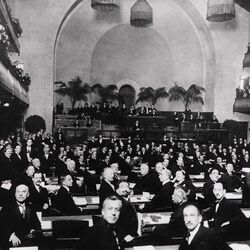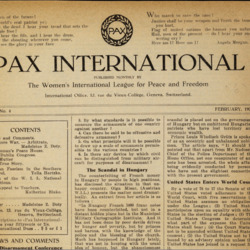When I landed in New York City on October 4th, 1925, I thought I knew something about America. Now after a stay of more than five months, during which I have been watching and studying this country of [marvelous] possibilities, I feel that I know very little.
I am beginning to realize the vastness and complication of the problems and the difficulty of understanding and doing justice to them. I read impressions of America from Europeans and Asiatics some of whom speak only about hip-flasks, standardizing, Ku Klux Klan, inadequacy of governmental measures, etc. That may be, and of course is, one side of the U.S.A., but why be so shortsighted as to dwell upon what is wrong or deficient, when there is so much that is good. That certainly does not make for international understanding. We are living in the age of internationalization. Between Versailles and Locarno we witnessed in Europe 137 official international Conferences, last year between June and September, 61 unofficial ones. The U.S.A. is taking its full share in this movement. Not only by the thousands who go over to attend conferences and study Europe, but also by attempts to get people interested on this side of the ocean. Wherever I went here I found new and old organizations for the study of Foreign Policy.
Now we may regret that more has not been done and that more people have not joined the W.I.L. But we can only expect one step at a time, and it is not easy to join a still unpopular movement. As Miss Addams said after the 50th Anniversary of the Chicago Women's Club: "If people want to know what it meant to start a women's club 50 years ago, they had better start a peace organization now!"
In order to understand America, three of her most important questions must be borne in mind: economic imperialism, immigration and Pan-America. This is not the place to discuss these questions even if I knew all about them but with regard to immigration, I should like to point out the great difficulties there are in school education. Many children do not know the English language when they go to school and practically never hear it at home. Then the throwing together of children with different national characters, inclinations and trends of mind stands in the way of working out a unifying plan.
If the U.S.A. is to be a unit, all the immigrants have to be Americanized and of course ought to be willing to be if they want to settle down in this new country. This may account for some of the standardizing so much objected to. I cannot see how this could be wholly avoided; it is a process of nationalization.
The U.S.A. being a young country, has been like a young individual that had to assert himself first, had to become something and someone before he can give much attention to others. This, years ago, created the Monroe Doctrine and the evident need for it. Since then, however, conditions have greatly changed. This powerful, rich and influential country need no longer be afraid of any foreign government interfering with its politics or of any [colonizing] tendencies from abroad! It seems quite natural, therefore, that the U.S.A. should officially as well as unofficially come into ever closer contact with the rest of the world, as it is doing by Americans working on nearly all the League of Nations Committees and now by the U.S.A. entering the World Court.
But along with this growing cooperation, there is still strong opposition. But even the most bitter attacks could never really harm a universal cause like the peace movement or a person like Miss Addams, though it strikes one as surprising that a nation with such high ideals should be so inconsistent as to make such attacks. On the whole the situation has greatly improved since 1924.
But in spite of improvement, the W.I.L. has by no means an easy task in the U.S.A. Its members have to be staunch pacifists. The Section counts about 8000 members, a relatively small but enthusiastic group, active and efficient. During the five months I have been here now, I have found out far better than we could in 1924, what it meant to them to face the immense problem of an International Congress, the first since the war.
Small though the group may be as compared to the vastness of the country, still I feel sure they have greatly influenced public opinion and that their pioneer work may account for the conversion of a considerable part of those who are now studying the causes and the cure of war or working in peace committees or foreign relations groups.
There is no doubt our U.S. Section is growing constantly and doing a fine piece of work. It has been brought home to me during my travels in this country that they have practically to work in 48 countries instead of one! A huge task! Plans are under way to [organize] the far West, a very different place from the East -- and hitherto pretty well untouched by the W.I.L.
The Washington Office and its acting secretary, Miss Dorothy Detzer, are extremely active and the importance of the W.I.L. is beginning to be recognized by other organizations which often turn to it now for information and speakers, etc. The W.I.L. played an important part in the propaganda for the U.S.A.'s entrance into the World Court. The Pennsylvania Branch for instance managed to have round table talks before the Radio on four Sunday evenings, discussing the matter from different aspects, each time by three speakers. Then a campaign is in progress against military training in high schools, colleges and universities, which, without the general public being aware of it, has taken alarming proportions. Not only the W.I.L. but also other organizations, among them the Youth Movement, have taken up this subject energetically. In some schools and colleges this military training is compulsory, in those where it is not, the students who refuse to take part in it are very unpopular and require a good deal of moral courage. The forming of the Reserve Officers Training Corps is not only greatly encouraged but paid for by the War Department, which has completed a study for a "Women's Army Service Corps, regularly uniformed and enlisted" and a woman has been added to the General Staff "to work out mobilization of American women for the 'next war.'" No wonder that the W.I.L. is very much concerned about it.
Besides this fight against military preparedness, a campaign against conscription is being considered. Miss Detzer has recommended the W.I.L. sections to endorse and work for a bill introduced on January 4, 1926 by Senator Shipstead, opposing all conscription and authorizing the President to have his representatives at the coming Disarmament Conference work for Abolition of Conscription for thirty years in all countries by an international treaty.
The U.S. Section, at the request of our International Executive, investigated the Haiti situation and a Committee was formed to visit Haiti which left the end of January. Miss Addams, on her cruise to the West Indies in March, is to land at Haiti and see this Committee.
Altogether I have been very much impressed with the serious work that is being done in the U.S.A. and with the fine people connected with the W.I.L. Having worked for three months with the Chicago Branch I know most about their work and find that their weekly meetings are always exceedingly interesting and on the whole very well attended. Dinners or luncheons with a speaker is a thing we are not used to in Europe, but they certainly seem to work well over here! We might try them, too!
It goes without saying that Miss [Addams'] influence is felt in many circles in Chicago and particularly in the peace movement. Hardly a day passes without her speaking somewhere or other when she is home, and numbers of people who opposed her during the war are now gradually changing their attitude. Herself a [center] of harmony, her wonderful spirit reaches far beyond the walls of Hull House. Not very long ago, after a questionnaire sent out to a thousand prominent people, she was again, by a very great majority, proclaimed as "the most interesting woman in the U.S.A." No wonder that where such power is at work, the opposition to peace should be stronger than in almost any other part of the U.S.A.
It is very interesting to me that almost in all quarters a great deal is expected from the women as having time and enthusiasm in fighting for the preservation of the life they create.
Whatever the future may bring, whatever the attempts at militarism and war, we know that public opinion, the conscience of the world, has been awakened and it is not likely it will be allowed to go back to its winter sleep -- if we continue our stirring and constructive work in full and loyal cooperation.
The U.S.A. can help us in this perhaps more than any other country of the world, freed as it is of the bonds of ancient traditions, of centuries-old feuds, of fear and lack of security. We may deem ourselves happy at the strong support she gives us and remember that without her and without the president she gave us as early as 1915 -- we could never have continued our work.
















Comments